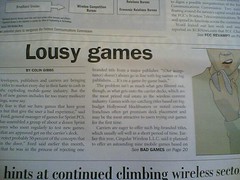I opened up my RCR Wireless News today. The center lead story “Lousy Games”. Below is some of the article that I think is really good, besides the continuation link, which reads “See BAD GAMES on Page 20”.
Developers, publishers and carriers are bringing new titles to market every day in their haste to cash in on the exploding mobile-game industry. But the crush of new games includes far too many mediocre offerings, some say.
“My fear is that we have games that have great names but that give the user a bad experience,” said Jason Ford, general manager of games for Sprint PCS. … We reject probably 50 percent of the concepts that come in the door,” Ford said earlier this month, adding that he was in the process of rejecting one branded title from a major publisher. “(Our acceptance) doesn’t always go in line with big names or big publishers. … It’s on a game-by-game basis.”
The problem isn’t as much what gets filtered out, though, as what gets onto the carrier decks, which are the most prized real estate in the wireless content industry. Games with eye-catching titles based on big-budget Hollywood blockbusters or noted console franchises often get premium deck placement and may be the most attractive to users trying out games for the first time.
The key to creating more quality games is moving beyond traditional games to titles that take advantage of the platform, said Erickson. While the wireless phone is an undeniably poor platform for traditional games, game makers have yet to take full advantage of its connectivity and mobility. Publishers should also develop games that offer self-refreshing content, Erickson said, encouraging user interaction and extending a game’s life cycle.
Need I say more?
Anita
